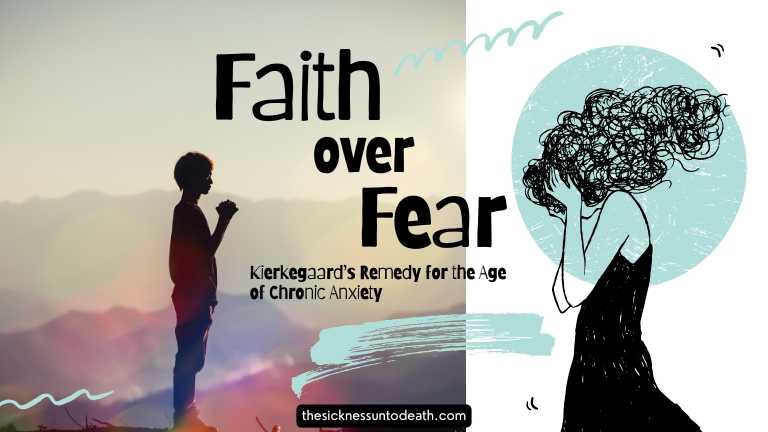Analyse how faith, in Kierkegaard’s view, can act as a powerful counter to the fear and paralysis so common in today’s world.
Anxiety has become one of the defining conditions of modern life. Whether it’s fear about the future, the pressure to succeed, or the relentless uncertainty of the world we live in, many of us find ourselves caught in a constant state of worry. We scroll, we overthink, we plan for every worst-case scenario—and yet still feel out of control.
But what if the solution isn’t to do more, plan harder, or numb ourselves to the noise? What if the answer lies not in control, but in faith?
This is the question Søren Kierkegaard, the 19th-century Danish philosopher and theologian, forces us to confront. And his answer is both ancient and strikingly relevant: in a world paralysed by fear, faith is the only true remedy.
Fear and the Modern Condition
Today’s anxiety isn’t just personal—it’s cultural. We live in an age where uncertainty is constant. Global instability, economic pressures, climate fears, and the endless stream of bad news leave many of us mentally and emotionally exhausted.
We’re told to “trust the process” or “manifest good vibes,” but beneath it all lies a deeper question: What are we really standing on?
For Kierkegaard, fear isn’t simply emotional discomfort—it’s existential. It reveals the fragility of a life built on shifting foundations. And unless we find something deeper to ground us, we’ll always be at the mercy of fear.
Faith as the Antidote
Kierkegaard’s solution is radical: faith in God. But not faith in the easy, surface-level sense. He calls for what he famously termed a “leap of faith”—a personal, inward commitment to trust in something higher, even when it makes no logical sense.
“To have faith is precisely to lose one’s mind so as to win God.”
Faith, for Kierkegaard, is not the opposite of reason—it’s the answer to fear. It doesn’t ignore the uncertainty. It moves through it, anchored by the belief that life has meaning beyond what we can see or control.
The Paralysis of Possibility
One of Kierkegaard’s most powerful ideas is that fear often comes not from limitation, but from possibility. Too many choices. Too many outcomes. Too much freedom.
He called this the “dizziness of freedom”—when we stand before all the possible directions our life could take and become overwhelmed by what might go wrong.
Faith, he suggests, is what steadies us in that dizzying moment. It grounds us not in outcome, but in relationship—our relationship to God, to truth, to who we are meant to become.
Faith doesn’t eliminate fear. But it gives us a way to live above it.
Choosing Faith in an Anxious World
So how does this translate into daily life?
Kierkegaard doesn’t promise a life free from anxiety. What he offers is the freedom to stop being controlled by it. Faith is a defiant act in a fearful world. It says: I may not know what tomorrow holds, but I trust the One who holds me.
In a culture that idolises control and perfection, faith invites us to surrender. Not as weakness, but as strength. Not as failure, but as freedom.
Final Thoughts
Fear may be the natural response to a chaotic world—but it doesn’t have to be the final one.
Kierkegaard believed that when we choose faith over fear, we begin to live with courage, clarity, and purpose. We stop reacting, and start becoming. We stop chasing certainty, and start living in trust.
So if anxiety has you stuck, spinning, or overwhelmed, perhaps it’s not a sign you’re failing—but a sign you’re being invited to step into something deeper.
Because sometimes, the only way out of fear… is through faith.

